
Program
The Undergraduate Program in Neuroscience allows you to focus on one of two streams – Cellular & Molecular or Behavioural & Cognitive – while giving you flexibility to explore other aspects of neuroscience.
Overview
Full program requirements can be found in the UBC Academic Calendar.
Click on the image below to zoom in and scroll through a year by year breakdown of courses.

Neuroscience Streams
In third year, students have the opportunity to specialise even further in one of two streams offered. Students may choose between the Cellular & Molecular Stream, or the Behavioural & Cognitive Stream. These streams give students the opportunity to explore different fields of neuroscience in more depth.
The chosen stream is determined by the student and does not require an additional application. After choosing a stream, students take 9 credits from a pre-determined list of courses. Students must still take a minimum of 3 credits from the stream they have not chosen.
Degree Requirements
Students in the Bachelor of Science have faculty requirements that they must complete in order to graduate and promotion requirements that are necessary to progress through their degree. Questions regarding these requirements should be directed to Science Advising.
Program Learning Objectives
- Describe and apply historical and foundational concepts and theories in neuroscience (including basic cellular, systems, behavioural and cognitive underpinnings) in a variety of contexts.
- Demonstrate a conceptual understanding and procedural knowledge of neuroscience and neuroscience research design and techniques.
- Describe behavioural features and explain neurobiological mechanisms of a range neurological and psychiatric conditions.
- Design a well-thought-out neuroscience experiment with human participants and/or animal subjects appropriate for conducting at an undergraduate level, including design, ethical approval, data collection, and statistical analyses.
- Summarize a primary neuroscience-related academic article, analyze its strengths, identify its limitations, and propose appropriate avenues for further inquiry.
- Review and integrate a body of neuroscience literature into a concise synopsis.
- Produce well-crafted instructions, reports, essays, presentations, discussions, and debates aimed at both neuroscientific and non-neuroscientific audiences.
- Explain the ethical and societal implications of neuroscience research and theory.
- Produce a well-substantiated critique based on ethical, design, methodological and interpretive considerations for: (1) a piece of neuroscience research (e.g., a research article); (2) a neuroscientific technique; and (3) a field of study in neuroscience.
- Develop, reflectively analyze, and edit a personalized curriculum and career plan.
- Provide, receive, and integrate peer/mentor feedback on academic work.
- Program effectively for the purposes of data collection, processing, analysis, and presentation.
Program Director and Program Advisor
Director: Dr. Steven Barnes (sjb@psych.ubc.ca)
Advisor: Ryan Bouma (advising@neuro.ubc.ca)
